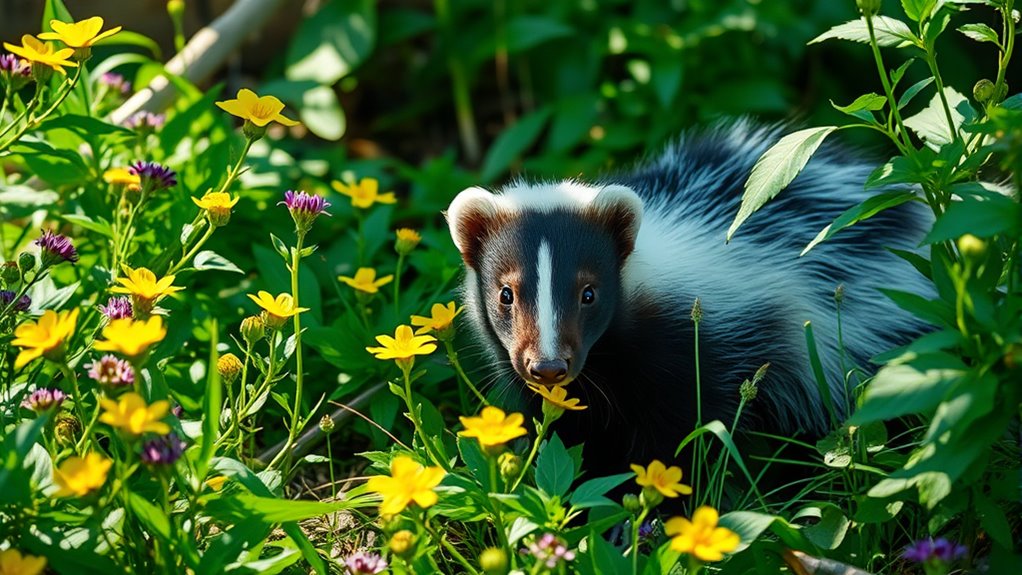Skunks are natural pest control heroes that play a crucial role in maintaining healthy ecosystems. They help reduce insects, beetles, larvae, and small rodents, all while thriving in urban and rural areas alike. Their calm nature and warning signals often keep them from spraying, making coexistence easier. By supporting skunks, you promote eco-friendly pest management and biodiversity. If you want to discover more about these underestimated allies, there’s plenty to learn about their benefits and how to live alongside them peacefully.
Key Takeaways
- Skunks naturally control pests like insects and rodents, reducing the need for harmful chemical pesticides.
- Their nocturnal foraging helps maintain balanced prey populations, supporting ecosystem health.
- By attracting beneficial wildlife, skunks contribute to biodiversity and ecological resilience.
- Their pest control role minimizes environmental impact and promotes sustainable, chemical-free pest management.
- Recognizing skunks’ ecological contributions encourages humane coexistence and habitat preservation.
Understanding Skunks’ Natural Role in Ecosystems

While skunks may be best known for their distinctive spray, they actually play an important role in maintaining healthy ecosystems. In urban habitats, skunks adapt well, balancing food source dynamics by controlling populations of insects, rodents, and other small pests. Their opportunistic feeding habits help regulate prey numbers, preventing overpopulation that could harm plant life and spread disease. You’ll notice that skunks often forage at night, contributing to the natural cycle of prey and predator relationships. Their presence in both rural and urban areas highlights their significance in the food web, ensuring ecosystems remain resilient and balanced. Additionally, their role as natural pest controllers helps reduce the need for chemical pest management, promoting environmental health. Skunks are more than just pests; they’re crucial players supporting ecological health.
The Benefits of Skunks in Pest Management
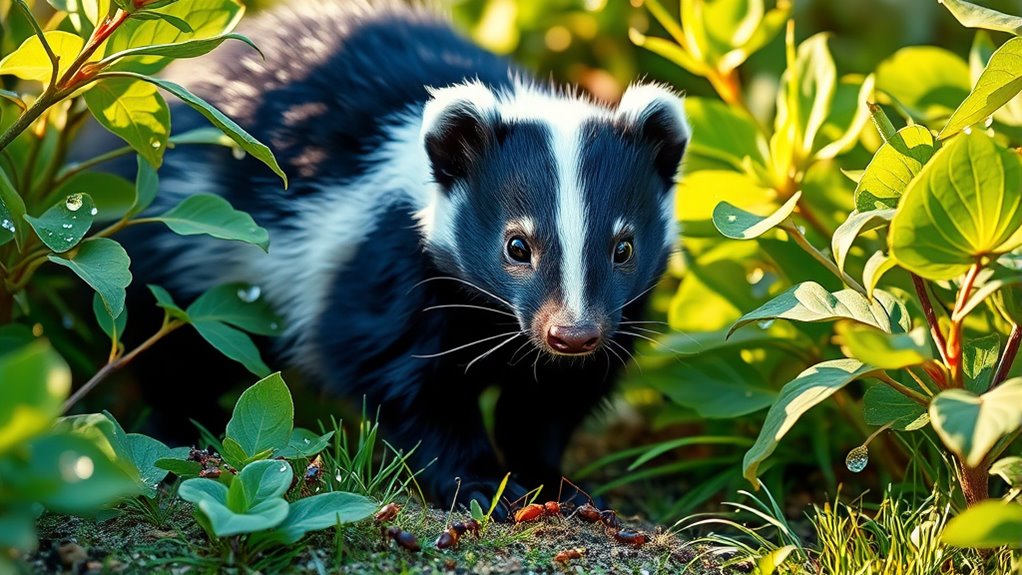
Skunks can naturally keep pests like insects and rodents in check, making them valuable allies in your yard. Relying on skunks offers an eco-friendly control method that reduces the need for chemical pesticides. By encouraging their presence, you support a healthier environment while managing pests effectively. Additionally, their role in natural pest control emphasizes their importance in maintaining ecological balance. Their ability to detect and forage for pests further enhances their value as natural pest controllers. Promoting sustainable pest management practices helps preserve local biodiversity and reduces chemical runoff. Recognizing their ecological contributions highlights the benefits of integrating skunks into an environmentally conscious pest control strategy. Supporting wildlife habitats can also attract more beneficial species, creating a balanced ecosystem in your yard.
Natural Pest Deterrent
Because skunks naturally hunt and eat many common garden pests, they can serve as effective, eco-friendly pest deterrents. Their skunk diet includes insects, grubs, beetles, and small rodents, which helps keep pest populations in check. Skunks thrive in diverse habitats, often making their homes in woodlands, grasslands, and suburban areas, where pests are abundant. By allowing skunks to inhabit your yard, you benefit from their natural pest control abilities without the need for chemical pesticides. They continuously hunt pests, reducing the chances of infestations. Since skunks prefer areas with ample cover and food sources, maintaining a habitat that supports their needs encourages their presence and supports your pest management efforts naturally. Creating a welcoming habitat for skunks can also contribute to biodiversity in your local ecosystem, further enhancing natural pest control. Promoting beneficial wildlife such as skunks can also help reduce the reliance on chemical agents that may harm the environment.
Eco-Friendly Control Method
Integrating skunks into your pest management plan offers a natural and sustainable alternative to chemical controls. Skunks have a diverse diet that includes insects, grubs, and small rodents, making them effective at reducing pest populations naturally. Their preferred skunk habitat includes woodlands, abandoned lots, and suburban areas where they can search for food without human interference. By encouraging skunks to stay nearby, you benefit from their relentless pursuit of pests, decreasing the need for chemical pesticides. Their foraging habits can also help control pest populations more efficiently than some traditional methods. This eco-friendly control method helps maintain a healthy balance in your yard, minimizes environmental impact, and reduces potential health risks associated with chemical use. Embracing skunks as part of your pest management strategy promotes a greener, safer approach to keeping your space pest-free.
Reduces Chemical Use
Using skunks in your pest control routine can considerably cut down on your reliance on chemical pesticides. They act as natural chemical alternatives, targeting pests like insects, grubs, and rodents without harmful side effects. By encouraging skunks to visit your yard, you reduce the need for conventional pesticide reduction, making your environment safer for kids, pets, and beneficial insects. Skunks naturally hunt and eat pests, providing an eco-friendly solution that minimizes chemical use. This approach not only promotes a healthier ecosystem but also lowers your exposure to toxic substances. Additionally, understanding the color accuracy of natural predators like skunks can help you better appreciate their role in maintaining a balanced ecosystem. Incorporating skunks into your pest management strategy offers a sustainable, effective alternative to chemical treatments, helping you maintain a pest-free yard without compromising safety or environmental integrity. Recognizing their ecological importance can deepen your appreciation for their role in natural pest control. Furthermore, promoting their habitat can enhance their effectiveness as beneficial predators in your yard.
Common Misconceptions About Skunks
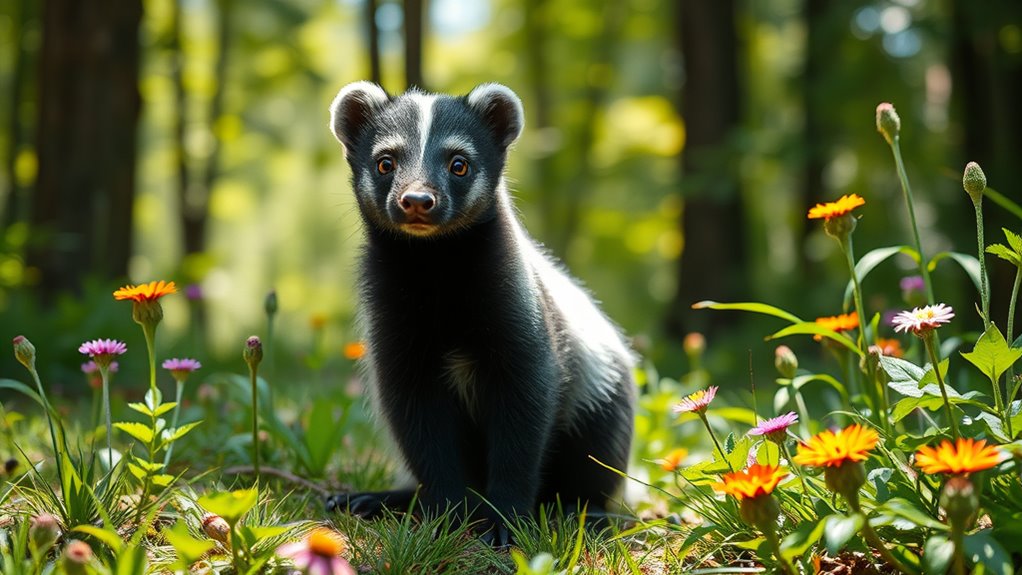
Many people believe skunks are aggressive, but they usually want to avoid confrontation. Not all skunks spray, and they often rely on other defensive tactics to protect themselves. Understanding these misconceptions helps you see skunks in a more accurate and respectful light. For example, their defense mechanisms include warning signals and retreat behaviors rather than immediate spraying. Recognizing their natural behaviors can lead to better coexistence and appreciation of these unique animals. Additionally, learning about their ecological role highlights how they contribute positively to the environment by controlling pests and maintaining healthy ecosystems. Recognizing their importance in pest control emphasizes their value in natural habitats and human environments alike.
Skunks Aren’t Aggressive
Despite the popular belief that skunks are aggressive creatures, they actually prefer to avoid conflict whenever possible. Their calm skunk appearance, with a rounded body and distinctive black-and-white markings, often makes people think they’re hostile. However, skunks are generally shy and non-confrontational. They’ll give warning signs, like stamping their feet or raising their tail, before spraying or defending themselves. Skunks aren’t aggressive by nature; they only spray when they feel threatened. Their diet mainly includes insects, small mammals, fruits, and plants, which doesn’t require them to be confrontational. Understanding their peaceful behavior helps change misconceptions, showing that skunks aren’t aggressive pests but gentle creatures that prefer to stay out of trouble. Additionally, their dietary habits are primarily non-aggressive, focusing on foraging rather than defending territory. Their defensive strategies, such as warning signals before spraying, further demonstrate their preference for peaceful coexistence. Moreover, their ability to adapt to various environments indicates a flexible and non-aggressive nature that helps them survive without conflict.
Not All Skunks Spray
You might think that all skunks are quick to spray at the slightest threat, but that’s a common misconception. Many skunks prefer to rely on their calm demeanor rather than spraying. Their skunk diet mainly includes insects, small mammals, and plants, which doesn’t make them aggressive. Skunk habitat varies from woodlands to suburban areas, where they often hide quietly rather than confront threats. Imagine this table:
| Skunk Behavior | Situation |
|---|---|
| Resting quietly | Non-threatening environment |
| Foraging peacefully | During feeding times |
| Avoiding conflict | When feeling safe |
| Spraying only when necessary | Threatened or cornered |
Not all skunks spray; many prefer to keep to themselves, making them less aggressive than popular myth suggests. Additionally, their behavioral tendencies often help them avoid conflict altogether. The ability of skunks to assess threat levels accurately prevents unnecessary spraying and helps them stay safe. Interestingly, their defense mechanisms are usually reserved for situations where escape is impossible, further emphasizing their generally non-aggressive nature. In fact, studies show that skunks use warning signals like foot stamping and raising their tails to deter threats before resorting to spraying.
Misunderstood Defensive Tactics
People often believe that skunks solely rely on their notorious spray for defense, but this is a significant misunderstanding. While chemical defenses like their spray are well-known, skunks also use other tactics to protect themselves. They often display territorial behavior, marking their space to ward off intruders. This behavior can include stomping, hissing, or raising their tails to appear larger, discouraging threats before they escalate. Skunks prefer to avoid conflict when possible, relying on warning signals rather than immediate spraying. Their defensive tactics are strategic, combining visual cues with chemical defenses only when necessary. Additionally, territorial behavior helps skunks establish boundaries and minimize confrontations with predators. Understanding these misunderstood tactics reveals that skunks are more than just spray artists—they’re cautious animals that use a range of methods to stay safe. Recognizing the importance of warning signals can help people better interpret skunk behavior and avoid unnecessary confrontations. Incorporating an awareness of animal communication and behavioral strategies can further enhance safety and coexistence with these animals. Awareness of predator deterrence techniques illustrates how skunks adapt their defenses effectively in various situations.
How Skunks Help Control Insect and Rodent Populations

Skunks play a valuable role in maintaining the balance of local ecosystems by actively controlling insect and rodent populations. Their diet mainly consists of insects like beetles, grasshoppers, and larvae, which help keep pest numbers in check. Additionally, skunks hunt small rodents such as mice and voles, reducing their abundance around homes and farms. You’ll find skunks in a variety of habitats, from forests to suburban areas, where they can easily access these food sources. By feeding on these pests, skunks naturally limit their populations, preventing overpopulation and potential crop or property damage. Their foraging habits make them an essential part of pest control, supporting healthier, more balanced ecosystems without the need for chemical interventions.
Safe and Humane Ways to Coexist With Skunks
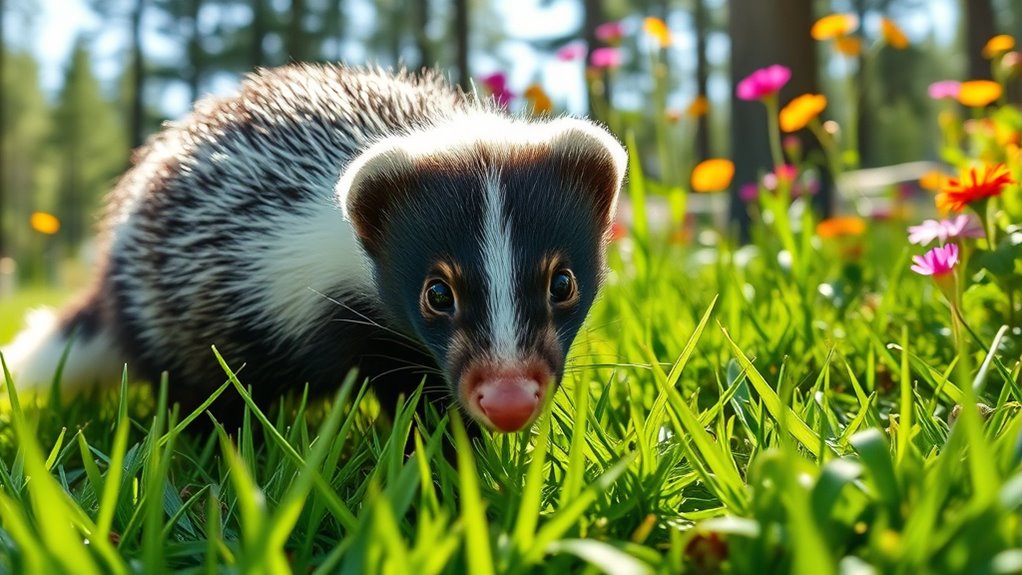
While skunks are beneficial for controlling pests, coexistence requires respectful and humane approaches to prevent conflicts. Understanding skunk behavior helps you avoid surprising them during urban encounters. Keep trash cans secure to prevent skunks from rummaging through your garbage, which can lead to unwanted visits. If you spot a skunk near your property, give it space and avoid sudden movements that might trigger its defense instinct. Installing motion-activated lights or sounds can deter skunks without harming them. Planting natural barriers like shrubs or fences creates a physical boundary, discouraging skunks from entering your yard. Remember, patience and respectful distance foster peaceful coexistence, ensuring both you and the skunks stay safe. These humane strategies promote harmony without harming these valuable wildlife neighbors.
Protecting Skunks and Supporting Biodiversity
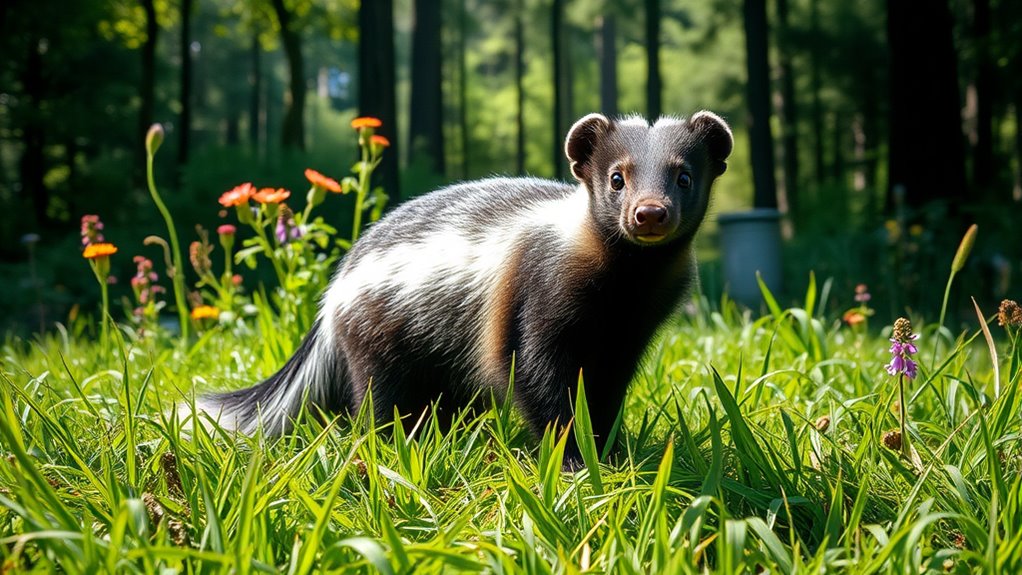
By adopting humane coexistence strategies, you help protect skunks and support the broader health of local ecosystems. Skunks have adapted to urban environments, creating new opportunities for coexistence. Protecting their habitats involves preserving green spaces and reducing habitat fragmentation, which benefits not only skunks but many other species. When you support local efforts to maintain natural areas, you help guarantee skunks can thrive alongside humans. Avoiding unnecessary harm and encouraging responsible land use foster urban adaptation, allowing skunks to find food and shelter safely. By respecting skunk habitats, you contribute to biodiversity preservation. This balanced approach helps sustain the intricate web of life, ensuring skunks play their crucial role as pest controllers and ecological contributors within diverse ecosystems.
Frequently Asked Questions
Are Skunks Beneficial for Urban Gardens and Backyard Ecosystems?
Yes, skunks are beneficial for urban gardens and backyard ecosystems. Their diet includes insects, grubs, and pests, helping keep pest populations in check naturally. Thanks to their urban adaptation, skunks thrive in city environments, providing pest control without chemicals. You might see them rummaging through your yard, but their presence actually supports a healthy, balanced ecosystem. Embracing these helpful creatures can improve your garden’s health and reduce pest issues effectively.
How Do Skunks Impact Local Biodiversity Beyond Pest Control?
Like a keystone in an arch, skunks help sustain local biodiversity by influencing skunk predator relationships and promoting habitat diversity. Their presence encourages a balanced ecosystem, supporting a variety of plants and animals. By controlling pests and serving as prey for predators, skunks maintain ecological stability, ensuring that different species thrive. Your neighborhood benefits from their role, which helps keep the environment healthy and resilient.
Can Skunks Be Trained or Encouraged to Stay in Specific Areas?
You can try skunk training by using positive reinforcement to encourage skunk territories in specific areas. Set up a designated zone with food and shelter, and reward skunks when they stay there. Consistency is key—regularly encourage and reinforce their presence in the area. While it’s challenging to fully train skunks, encouraging skunk territories can help manage their movement and reduce unwanted encounters in your yard.
What Are the Signs of Healthy Skunk Populations in an Area?
You can tell a healthy skunk population by observing active skunk mating rituals, especially during mating season when males and females are more visible. Look for fresh skunk territorial marking, such as scent markings around their den sites, indicating they’re establishing and defending their territory. Healthy skunks are active, alert, and exhibit natural behaviors like foraging and scent marking, showing they’re thriving in their environment.
How Do Climate Changes Affect Skunk Behaviors and Populations?
You might worry climate changes will harm skunks, but they actually adapt well through climate-induced migration and flexible behaviors. As temperatures rise or habitats shift, skunks move to new areas and adjust their foraging or denning strategies. This resilience helps maintain their populations, allowing them to continue controlling pests naturally. So, despite climate shifts, skunks find ways to thrive, benefiting ecosystems and pest control efforts alike.
Conclusion
So, savor the significance of skunks, species serving as nature’s pest control protectors. By respecting and responsibly coexisting with these creatures, you help uphold biodiversity and balance in your backyard. Remember, managing misconceptions and making mindful modifications can turn skunks from pests into partners. Celebrate their natural role, and you’ll find that fostering fair, friendly, and fuss-free familiarity benefits both you and your backyard biodiversity. Embrace these marvelous, misunderstood mammals and marvel at nature’s balanced beauty.
